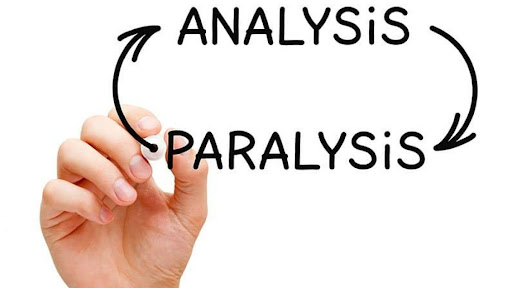
Incapacity to decide: Analysis Paralysis
This era's number and variety of possibilities give rise to a neurological condition known as "Analysis Paralysis," which impairs concentration, memory, comprehension, and the ability to evaluate and comprehend information.
It is, in a metaphorical sense, the incapacity to decide that arises from overanalyzing the circumstance and calls for quick action.
Stated differently, analysis paralysis refers to a process when an excessive amount of analysis or overthinking of a certain circumstance results in the decision-making process becoming "paralyzed."
1. An explanation of analysis paralysis
1. Difficulties with decision-making: Affected individuals struggle to assess information and come to the right conclusions.
2. Difficulty processing information: Individuals who suffer from analysis paralysis find it difficult to focus and organize their thoughts.
3. Diminished Memory Capacity: Individuals impacted frequently struggle to recall details and occurrences.
2. Analysis paralysis symptoms
1. Emotional symptoms: Anxiety, despair, and frustration brought on by difficulty reasoning and analyzing.
2. Behavioral symptoms: Difficulty adjusting to changes and hesitation while making judgments.
3. Cognitive symptoms: Inability to focus, recall, or comprehend complicated material.
3. The most reasons of paralysis in analysis
1. Persistent anxiety and stress: High levels of stress might impair cognitive processes.
2. Neurological disorders: Dementia and stroke are two examples of disorders that might result in analysis paralysis.
4. Analysis of the paralysis diagnosis
1. Clinical examination: The physician assesses the patient's medical background and symptoms.
2. Psychological testing: To assess, provide a battery of cognitive and psychological tests.
3. Magnetic resonance imaging: To detect any alterations in the brain regions linked to analytical paralysis
5. Analytical paralysis treatment
1.Rehabilitation: Activities aimed at enhancing cognitive thinking and processing skills.
2.Occupational therapy: To improve everyday abilities and deal with challenges.
3.Cognitive behavioral therapy: To enhance memory, focus, and cognitive abilities.
6. Avoiding analysis paralysis
1. Stress management: Managing nervous and psychological stress in a healthy way.
2. Sufficient sleep: To preserve the health of your brain, get enough sleep.
3. Exercise: Getting moving enhances brain function.
4. Proper diet: Consume a well-balanced diet that is high in the nutrients that the brain needs.
Final thoughts and advice
A neurological condition called analysis paralysis impairs one's capacity for efficient thought and information processing. It is essential to identify the reasons and symptoms, receive the proper diagnosis, and begin therapy. People suffering from analysis paralysis can recover from this condition if they approach the issue constructively and receive support from their friends and family.
* Farhan Hassan Al Shammari
Twitter: @farhan_939
E-mail: fhshasn@gmail.com








